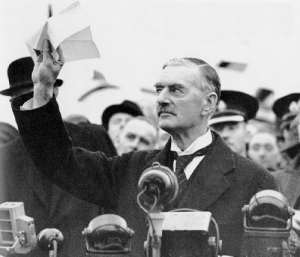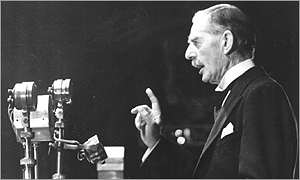I want to offer a couple of speeches from British Prime Minister Neville Chamberlain, prior to WWII. I’m not going to attempt to make any statements or pronouncements. My only goal is reflection.
The first is after the Munich Appeasement, I’m sorry, Agreement:

After everything that has been said about the German Chancellor today and in the past, I do feel that the House ought to recognise the difficulty for a man in that position to take back such emphatic declarations as he had already made amidst the enthusiastic cheers of his supporters, and to recognise that in consenting, even though it were only at the last moment, to discuss with the representatives of other Powers those things which he had declared he had already decided once for all, was a real and a substantial contribution on his part. With regard to Signor Mussolini, . . . I think that Europe and the world have reason to be grateful to the head of the Italian government for his work in contributing to a peaceful solution.
In my view the strongest force of all, one which grew and took fresh shapes and forms every day war, the force not of any one individual, but was that unmistakable sense of unanimity among the peoples of the world that war must somehow be averted. The peoples of the British Empire were at one with those of Germany, of France and of Italy, and their anxiety, their intense desire for peace, pervaded the whole atmosphere of the conference, and I believe that that, and not threats, made possible the concessions that were made. I know the House will want to hear what I am sure it does not doubt, that throughout these discussions the Dominions, the Governments of the Dominions, have been kept in the closest touch with the march of events by telegraph and by personal contact, and I would like to say how greatly I was encouraged on each of the journeys I made to Germany by the knowledge that I went with the good wishes of the Governments of the Dominions. They shared all our anxieties and all our hopes. They rejoiced with us that peace was preserved, and with us they look forward to further efforts to consolidate what has been done.
Ever since I assumed my present office my main purpose has been to work for the pacification of Europe, for the removal of those suspicions and those animosities which have so long poisoned the air. The path which leads to appeasement is long and bristles with obstacles. The question of Czechoslovakia is the latest and perhaps the most dangerous. Now that we have got past it, I feel that it may be possible to make further progress along the road to sanity.
From Great Britain, Parliamentary Debates, Commons, Vol. 339 (October 3, 1938)
After Hitler gained the time he needed to ready his army, he went ahead with his plans. Facing a revolting Cabinet and a growing awareness in Britain that Hitler was evil and bent on European dominance, and realizing the failure of his utopian ideals, Chamberlain had no other choice.

I am speaking to you from the Cabinet Room at 10 Downing Street.
This morning the British Ambassador in Berlin handed the German Government a final note stating that, unless we hear from them by 11 o’clock that they were prepared at once to withdraw their troops from Poland, a state of war would exist between us. I have to tell you now that no such undertaking has been received, and that consequently this country is at war with Germany.
You can imagine what a bitter blow it is to me that all my long struggle to win peace has failed. Yet I cannot believe that there is anything more or anything different that I could have done and that would have been more successful.
Up to the very last it would have been quite possible to have arranged a peaceful and honourable settlement between Germany and Poland, but Hitler would not have it. He had evidently made up his mind to attack Poland, whatever happened, and although he now says he put forward reasonable proposals which were rejected by the Poles, that is not a true statement.
The proposals were never shown to the Poles, nor to us, and though they were announced in a German broadcast on Thursday night, Hitler did not wait to hear comments on them but ordered his troops to cross the Polish frontier the next morning.
His action shows convincingly that there is no chance of expecting that this man will ever give up his practice of using force to gain his will. He can only be stopped by force.
We and France are today, in fulfilment of our obligations, going to the aid of Poland, who is so bravely resisting this wicked and unprovoked attack upon her people. We have a clear conscience – we have done all that any country could do to establish peace.
The situation in which no word given by Germany’s ruler could be trusted, and no people or country could feel itself safe, has become intolerable. And now that we have resolved to finish it I know that you will play your part with calmness and courage.
At such a moment as this the assurances of support which we have received from the empire are a source of profound encouragement to us.
When I have finished speaking, certain detailed announcements will be made on behalf of the government. Give these your closest attention. The government have made plans under which it will be possible to carry on work of the nation in the days of stress and strain that may be ahead…
Now may God bless you all. May He defend the right. For it is evil things that we shall be fighting against – brute force, bad faith, injustice, oppression and persecution – and against them I am certain that right will prevail.
Unlike Churchill who was a historian and understood very early what they were facing in Hitler and the Nazis, Chamberlain took way too long to understand the evil he was facing.
The United States would take even longer…